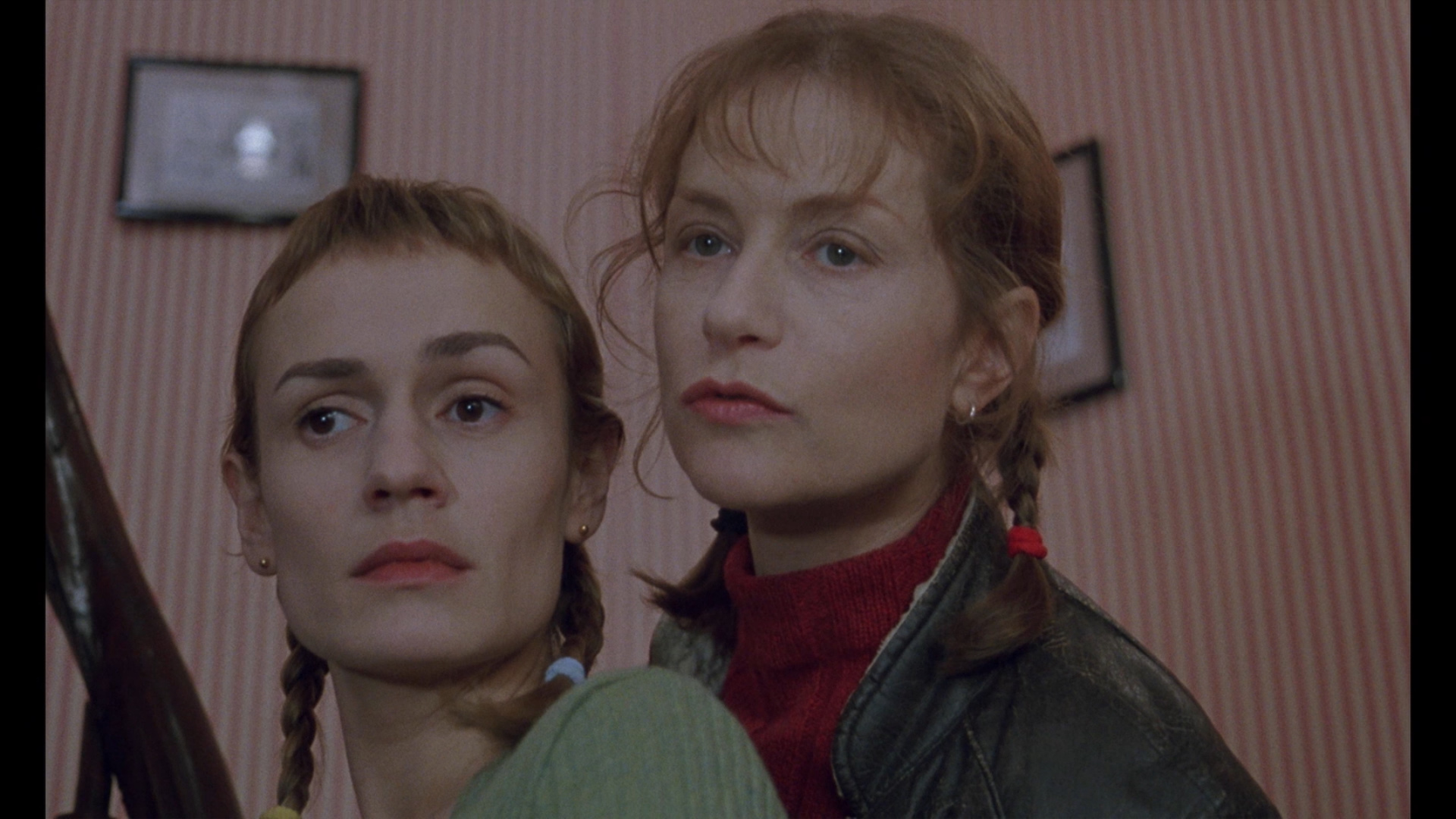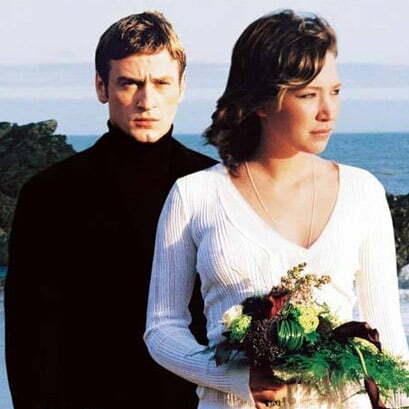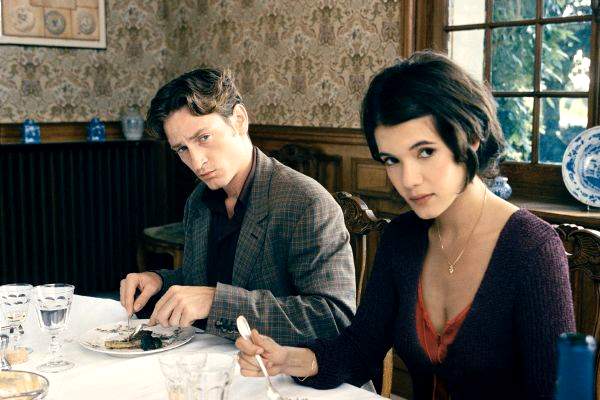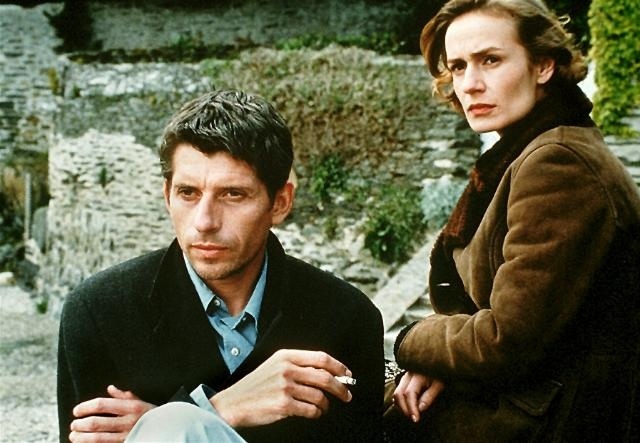La Cérémonie
 Saturday, July 18, 2015 at 17:48
Saturday, July 18, 2015 at 17:48 We will leave an explanation of this film's title to the curious who believe that the Internet could not possibly lie to them. Its translation may indeed shed some light on the plot – that is, if you like your plots brightly lit – yet the English novel on which the film is based is called A Judgement in Stone. And while most movie versions employ a literal translation of the French, German has chosen "Beasts," and Italian, "The Darkness in the Mind." What kind of film could possibly inspire such diverse nomenclature? One most certainly of beasts and judgements, although these labels hang loosely to more than a few objects. And the country home that serves as the centerpiece of our action has more than a few objects to go around.
 Our protagonist is a morose, tomboyish, yet attractive housekeeper with a name out of a socialist realist novel, Sophie Bonhomme (Sandrine Bonnaire). When we first see her, she is somewhat late to an appointment with the debonair and rather stunning Catherine Lelièvre (an equally stunning Jacqueline Bisset) at a café that admittedly makes Catherine nervous. Why should a woman of the world, a former model (we are informed later by a dubious source), and a member of the upper crust of society, feel ill at ease in a mediocre little bistro, the likes of which litter France as pigeons occupy Rome? Better to let the events speak for themselves. Catherine warns Sophie – although the warning is like much of Catherine's persona, wholly disingenuous – that the house is remote. "Is that a problem?" she asks, also not caring whether it is. "I don't know," replies Sophie, an answer that startles Catherine. Throughout the film Sophie will recur to this slogan of her ignorance, and on numerous occasions Catherine will be startled either because Sophie should obviously know or because her indifference to that knowledge comes off as terrifying. Catherine's clear, lightly-accented French hints at a privileged life spend abroad in foreign tongues, perhaps indeed very privileged. Alas, she has had little success with domestics of late (such is the curse of the wealthy unable to procure the perfect assistant) and Sophie was laid off after her employer's husband died suddenly. "She's moving to Australia to be with her son," she tells Catherine, who couldn't care less what happens to the former employer provided the reference is solid. Sophie presents her letter of recommendation, but does so in a manner that will strike the careful viewer as unusual. We cannot see Catherine's face at that very moment, so it is impossible to detect whether the same sensation creeps over her features, but the way Sophie points to the name and address on the top of the letter makes us uncomfortable. The two ladies hit it off as much as they can given that they are negotiating the blandest of business deals, Sophie agitatedly mentions her previous salary, Catherine catches on and hikes it by ten percent, and all of a sudden there is nothing more to talk about. For her first day of work, Sophie's employer will fetch her at nine on Tuesday from the local train station. And what day is it today, asks the employee. Saturday, says a startled Mrs. Lelièvre, who doesn't really notice anything wrong although she very well should.
Our protagonist is a morose, tomboyish, yet attractive housekeeper with a name out of a socialist realist novel, Sophie Bonhomme (Sandrine Bonnaire). When we first see her, she is somewhat late to an appointment with the debonair and rather stunning Catherine Lelièvre (an equally stunning Jacqueline Bisset) at a café that admittedly makes Catherine nervous. Why should a woman of the world, a former model (we are informed later by a dubious source), and a member of the upper crust of society, feel ill at ease in a mediocre little bistro, the likes of which litter France as pigeons occupy Rome? Better to let the events speak for themselves. Catherine warns Sophie – although the warning is like much of Catherine's persona, wholly disingenuous – that the house is remote. "Is that a problem?" she asks, also not caring whether it is. "I don't know," replies Sophie, an answer that startles Catherine. Throughout the film Sophie will recur to this slogan of her ignorance, and on numerous occasions Catherine will be startled either because Sophie should obviously know or because her indifference to that knowledge comes off as terrifying. Catherine's clear, lightly-accented French hints at a privileged life spend abroad in foreign tongues, perhaps indeed very privileged. Alas, she has had little success with domestics of late (such is the curse of the wealthy unable to procure the perfect assistant) and Sophie was laid off after her employer's husband died suddenly. "She's moving to Australia to be with her son," she tells Catherine, who couldn't care less what happens to the former employer provided the reference is solid. Sophie presents her letter of recommendation, but does so in a manner that will strike the careful viewer as unusual. We cannot see Catherine's face at that very moment, so it is impossible to detect whether the same sensation creeps over her features, but the way Sophie points to the name and address on the top of the letter makes us uncomfortable. The two ladies hit it off as much as they can given that they are negotiating the blandest of business deals, Sophie agitatedly mentions her previous salary, Catherine catches on and hikes it by ten percent, and all of a sudden there is nothing more to talk about. For her first day of work, Sophie's employer will fetch her at nine on Tuesday from the local train station. And what day is it today, asks the employee. Saturday, says a startled Mrs. Lelièvre, who doesn't really notice anything wrong although she very well should.
This scene, one of the very best opening vignettes you will ever see, foreshadows every detail to come. We may even generously interpret Sophie's listless looks over Catherine's shoulder as symbolizing her gaze at another character, one who hasn't been mentioned but who figures prominently in our story, and one who can also be symbolized by a letter since her work comprises the handling of others' written correspondence. That remarkable shrew is the local postmistress Jeanne (Isabelle Huppert). For my money, Huppert and Emily Watson are the world's two most talented actresses, but let us not digress. Catherine returns to her remote manor for a family dinner of moules-frites, without, it appears, the frites. The reactions towards Sophie's hiring are mixed: her recently teen son Gilles (Valentin Merlet) inquires as to her looks (Catherine, of course, "did not notice" anything except that "she wasn't awful"); her nineteen-year-old stepdaughter Melinda (Virginie Ledoyen) wonders as many educated young people do about the wages and conditions of their imminent housekeeper; and her greybeard husband Georges (Jean-Pierre Cassel) just wants to eat his mussels, listen to Mozart, and hope it all works out for the best. One may consider this blended quartet a microcosm of upper-class interests – money and labor negotiations, hedonism, overidentification with the less fortunate owing, it is assumed, to guilt, and a Pollyanna-like aversion to conflict coupled with a longing for higher culture – or one may not. Since the confrontations that will arise pit the well-off against those who perform services for the selfsame elite, the most facile of readings will have something to do with the proletariat – but now we must really put a stop to this silliness and return to that train station.
Somehow we know that when the nine o'clock Tuesday morning train arrives, Sophie won't be on it. We are so sure of this, in fact, that we search for the same intuition in Catherine, who seems to know it as well, although she cannot quite fathom why. Since we are still in that tenebrous age before cell phones, our brooding employer takes out a cigarette and puffs away furiously – that is, until she espies Sophie on the other side of the platform. Sophie, who is wearing exactly what she wore to the bistro, has taken an earlier train with the explanation that she did not want to be late, which may ultimately rank as the most plausible of her countless lies in La Cérémonie. As the two approach Catherine's car, they are accosted by Jeanne looking for a ride to work, and we should say something about this Jeanne. In and around town Jeanne Marcal is known for four things: her gaudy, Pippi Longstocking-like wardrobe; her snooping (in her profession that means rendering unto mail recipients what Caesar's taster used to render unto Caesar); her volunteering for the Church, although she has no evident spirituality and simply desires to help the poor; and her past tragedy, as she once upon a time was acquitted for the negligent death of her small daughter. The description of this dreadful event that she confesses to Sophie omits so much detail as to make us wonder what, if anything, she ever says is true. Everything she utters, be it whimsical, cruel, or objectively intelligent, is punctuated by the same myopic smile. Yet somehow we believe, if for but a moment, that it was society not Jeanne who killed her daughter. Society who made her an outcast and a single mother; society who let her dwell in a tiny apartment with an exposed oven; society that rushed to damn her before she could even muster a defense. Thus ten minutes into our film, we have been sufficiently introduced to the three female leads, all seated in one car and revving off in the same and yet very different directions. When Jeanne smiles at Sophie with that myopic smile, the latter looks perplexed as to why anyone would smile at her. Later, towards the middle of the film, Sophie will finally return the smile and our story assumes a very different tenor.
There is a poorly-kept secret in La Cérémonie that outrattles the other, less consequential skeletons surfacing one after another like zombies. The scene in which the truth is 'revealed' (any half-awake viewer would have reached the same conclusion well before this point) seems overwrought and melodramatic, but the grief and anger that ooze out foretell the wickedness of the tale's end. In more than one scene we see despair, white-man-in-China despair, an abyss of hopelessness that gapes like a leviathan. The secret soon becomes the justification for all of Sophie's passive-aggressive charades, although it should be said that her personality is so damaged to begin with that no excuse will suffice. I have said less about Jeanne, a creature from a very black lagoon, because what is said about her in the film is so clear yet so terrifying that we shudder to consider the fact that we probably all know people just like her. Cheeky, impish, prying, cheerfully mischievous in an effort to mask true malevolence, intelligent in that way unique to very smart people who have come to envy life and all its inhabitants, Jeanne skips around, gleefully pinching fruit from a vendor like some insolent street urchin. We find her so frightening precisely because she is mindfully incalculable. And what about Sophie? In one respect Sophie embodies the plight of the typical domestic servant, who may be likened in this instance to a piece of furniture: something you acquire, place in a comfortable spot, and only notice ever again when you start tripping over it. As for the darkness and the ceremony, well, we would probably be better off just going and helping the poor. Just like Jeanne.





